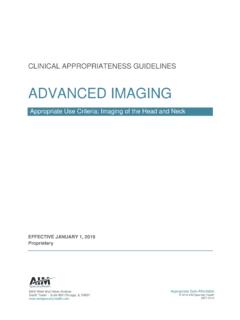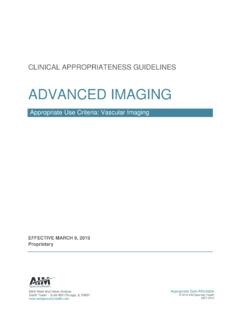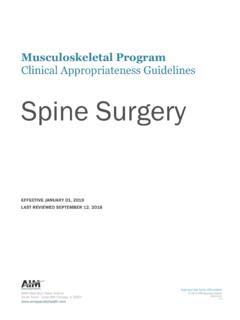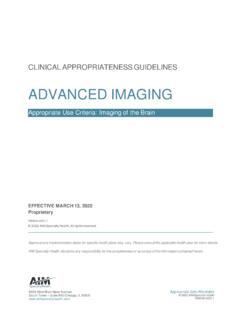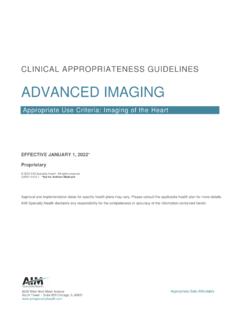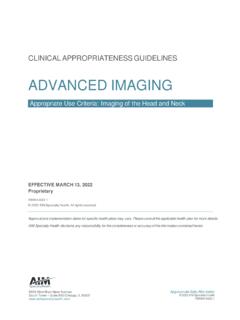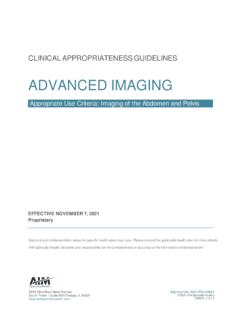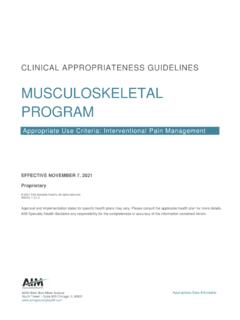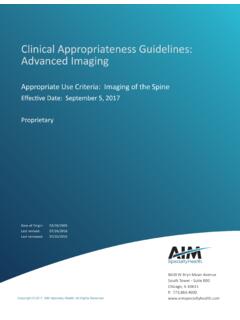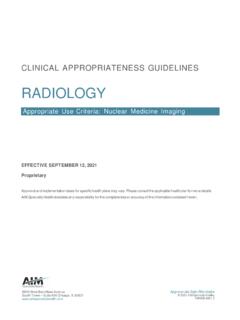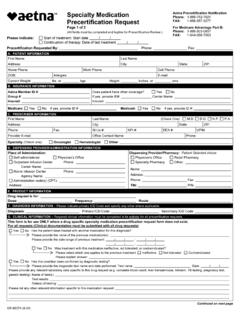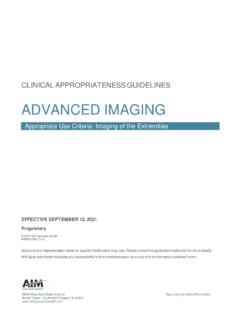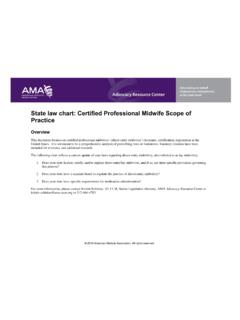Transcription of OUTPATIENT REHABILITATIVE AND HABILITATIVE …
1 8600 West Bryn Mawr Avenue South Tower Suite 800 Chicago, IL 60631 Effective Date: 06/12/2022 Version Creation Date: 08/31/2021 Approval and implementation dates for specific health plans may vary. Please consult the applicable health plan for more details. AIM specialty Health disclaims any responsibility for the completeness or accuracy of the information contained herein. CLINICAL APPROPRIATENESS GUIDELINES OUTPATIENT REHABILITATIVE AND HABILITATIVE SERVICES Appropriate Use Criteria: Physical Therapy, Occupational Therapy, and Speech Therapy Proprietary 2022 AIM specialty Health.
2 All rights reserved. REHABILITATIVE and HABILITATIVE Services 2022 AIM specialty Health. All rights reserved. 2 Table of Contents CLINICAL APPROPRIATENESS GUIDELINES .. 1 Table of Contents .. 2 Description and Application of the Guidelines .. 3 General Clinical Guideline .. 4 REHABILITATIVE AND HABILITATIVE THERAPIES .. 6 Physical Therapy .. 6 Occupational Therapy .. 16 Speech-Language Pathology .. 25 ADJUNCTIVE & ALTERNATIVE TREATMENTS .. 32 Physical Therapy and Occupational Therapy Adjunctive Treatments .. 32 Speech Therapy Alternative Treatments .. 53 History .. 58 REHABILITATIVE and HABILITATIVE Services 2022 AIM specialty Health.
3 All rights reserved. 3 Description and Application of the Guidelines The AIM Clinical Appropriateness Guidelines (hereinafter the AIM Clinical Appropriateness Guidelines or the Guidelines ) are designed to assist providers in making the most appropriate treatment decision for a specific clinical condition for an individual. As used by AIM, the Guidelines establish objective and evidence-based criteria for medical necessity determinations where possible. In the process, multiple functions are accomplished: To establish criteria for when services are medically necessary To assist the practitioner as an educational tool To encourage standardization of medical practice patterns To curtail the performance of inappropriate and/or duplicate services To advocate for patient safety concerns To enhance the quality of health care To promote the most efficient and cost-effective use of services The AIM guideline development process complies with applicable accreditation standards.
4 Including the requirement that the Guidelines be developed with involvement from appropriate providers with current clinical expertise relevant to the Guidelines under review and be based on the most up-to-date clinical principles and best practices. Relevant citations are included in the References section attached to each Guideline. AIM reviews all of its Guidelines at least annually. AIM makes its Guidelines publicly available on its website twenty-four hours a day, seven days a week. Copies of the AIM Clinical Appropriateness Guidelines are also available upon oral or written request.
5 Although the Guidelines are publicly-available, AIM considers the Guidelines to be important, proprietary information of AIM, which cannot be sold, assigned, leased, licensed, reproduced or distributed without the written consent of AIM. AIM applies objective and evidence-based criteria, and takes individual circumstances and the local delivery system into account when determining the medical appropriateness of health care services. The AIM Guidelines are just guidelines for the provision of specialty health services. These criteria are designed to guide both providers and reviewers to the most appropriate services based on a patient s unique circumstances.
6 In all cases, clinical judgment consistent with the standards of good medical practice should be used when applying the Guidelines. Guideline determinations are made based on the information provided at the time of the request. It is expected that medical necessity decisions may change as new information is provided or based on unique aspects of the patient s condition. The treating clinician has final authority and responsibility for treatment decisions regarding the care of the patient and for justifying and demonstrating the existence of medical necessity for the requested service.
7 The Guidelines are not a substitute for the experience and judgment of a physician or other health care professionals. Any clinician seeking to apply or consult the Guidelines is expected to use independent medical judgment in the context of individual clinical circumstances to determine any patient s care or treatment. The Guidelines do not address coverage, benefit or other plan specific issues. Applicable federal and state coverage mandates take precedence over these clinical guidelines. If requested by a health plan, AIM will review requests based on health plan medical policy/guidelines in lieu of the AIM Guidelines.
8 The Guidelines may also be used by the health plan or by AIM for purposes of provider education, or to review the medical necessity of services by any provider who has been notified of the need for medical necessity review, due to billing practices or claims that are not consistent with other providers in terms of frequency or some other manner. REHABILITATIVE and HABILITATIVE Services 2022 AIM specialty Health. All rights reserved. 4 General Clinical Guideline Clinical Appropriateness Framework Critical to any finding of clinical appropriateness under the guidelines for a specific diagnostic or therapeutic intervention are the following elements: Prior to any intervention, it is essential that the clinician confirm the diagnosis or establish its pretest likelihood based on a complete evaluation of the patient.
9 This includes a history and physical examination and, where applicable, a review of relevant laboratory studies, diagnostic testing, and response to prior therapeutic intervention. The anticipated benefit of the recommended intervention should outweigh any potential harms that may result (net benefit). Current literature and/or standards of medical practice should support that the recommended intervention offers the greatest net benefit among competing alternatives. Based on the clinical evaluation, current literature, and standards of medical practice, there exists a reasonable likelihood that the intervention will change management and/or lead to an improved outcome for the patient.
10 Providers may be required to submit clinical documentation in support of a request for services. Such documentation must a) be current enough to accurately reflect the clinical situation at the time of the requested service, and b) contain the elements necessary to determine compliance with guideline criteria without AIM physician reviewers having to make assumptions or interpretations about an ordering provider s clinical intent. If these elements are not established with respect to a given request, the determination of appropriateness will most likely require a peer-to-peer conversation to understand the individual and unique facts that would supersede the requirements set forth above.
